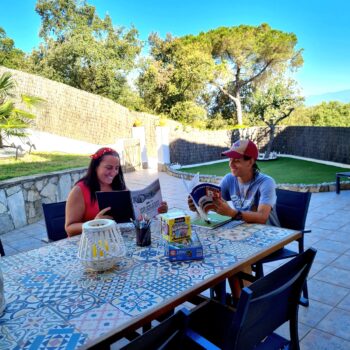

The summer has come, a perfect time for love, echoing the spirit of “Romance de Verano.” During holidays or trips, when we’re open to life, love seems to find us. These days, relaxed and satisfied, we attract love more easily. Celebrating Valentine’s Day in the Spanish-speaking world, whether it’s during summer or on a special date in February, involves romantically expressing feelings.
Words are powerful in winning someone’s heart, especially in Spanish, a language rich in romantic and Valentine’s Day expressions. Think of the charm of a red rose or the sweetness of chocolate, typical gifts from El Corte Inglés on George’s Day. In Spain and Latin America, using the right Spanish Valentine’s Day phrases can captivate just as effectively.
So, we present Spanish vocabulary, romantic and entertaining phrases, maybe a bit kitsch, but perfect for courting. These are the expressions of love “Amar,” often heard in Spanish-speaking countries during the most romantic times, celebrating “Amor y La Amistad” in a unique way.
20 Spanish Valentine’s Day Phrases from Spanish-Speaking World
The Spanish Royal Academy defines a flirtatious comment as a “brief saying of a quality of someone, especially the beauty of a woman”.
Here we present to you some of the most ingenious and romantic flirtatious comments that have been invented to use Spanish to captivate and win the love of a person.
| NO. | Spanish | English |
| 1. | ¡Ahora resulta que las estatuas caminan! | Now it turns out that the statues walk! |
| 2. | Me gustaría ser papel para poder envolver ese bombón. | I would like being a role to be able to wrap this bonbon. |
| 3. | Por ti, subiría al cielo en bicicleta y bajaría sin frenos. | For you, I would ride to the sky on a bicycle and would go down without brakes. |
| 4. | Quién fuera agonizante para morir en los brazos de este ángel. | Who was agonizing to die in the arms of this angel? |
| 5. | Quiero ser bolsa de mano para andar de tu brazo. | I want to be a handbag held in your arm. |
| 6. | Si mi amor por ti fuera música, tú serías la letra más bella de mi cancionero. | If my love for you were music, you would be the most beautiful letter of my songbook. |
| 7. | Me gustaría ser tu sombra para estar todo el día a tu lado. | I would like being your shade to be the whole day next to you. |
| 8. | Quién quisiera ser tu Sol para alumbrar tu día y la luna para velar tus sueños. | Who would be the Sun to be the light to your day and the Moon to watch your sleep? |
| 9. | Mi cielo, ahora también soy astronauta, pues a tu lado vivo en la luna. | My sky, now I am also an astronaut since next to you I live on the moon. |
| 10. | De ti, hasta las flores están celosas, porque de todas tú eres la más hermosa. | Even the flowers are jealous of you because you are the most beautiful of them all. |
| 11. | Quisiera ser un pájaro para cantar en tu ventana cada mañana y así despertarte con melodías de amor. | I would like to be a bird to sing in your window every morning and wake you up with love melodies. |
| 12. | Cinco calles he cruzado, seis con el callejón; solo me falta una para llegar a tu corazón. | Five streets I have crossed, six with the alley; only is missing one to come to your heart. |
| 13. | Ya sé por qué el mar es salado; porque todo lo dulce te lo llevaste tú. | I already know why the sea is salty; because you took with you everything sweet. |
| 14. | Además de una rosa, te regalo un espejo porque después de ti lo más bonito es el reflejo. | In addition to a rose, I give you a mirror, because after you the nicest thing is the reflex. |
| 15. | Voy a tener que cobrarte alquiler porque desde que te vi no has dejado de vivir en mis sueños | You will have to pay my rent because, since I saw you, you have not stopped living in my dreams. |
| 16. | ¿Sabes por qué los ángeles están enfadados conmigo? Porque en vez de soñar con ellos sueño contigo. | Do you know why are the angels upset with me? Because instead of dreaming of them I dream of you. |
| 17. | Tus ojos son dos luceros pero también son dos ladrones. El derecho roba besos y el izquierdo corazones. | Your eyes are two bright stars but also they are two thieves. The left steals kisses and the right steals hearts. |
| 18. | Quisiera ser caramelo, qué ilusión tan loca, par pasearme por tu piel y derretirme en tu boca. | I would like to be caramel, what a so crazy illusion, to walk by your skin and to melt in your mouth. |
| 19. | Que te quiero no lo niego, que me quieras no lo sé, pero tenlo por seguro que de ti me enamoré. | That I love you I don’t deny it, that you love me I don´t know, but for sure I fell in love with you. |
| 20. | Regálame un diccionario porque desde que nos cruzamos por primera vez me dejaste sin palabras. | Give me a dictionary because since we cross for the first time you left me without words. |
The prettier poems of love in Spanish
For the end, the cherry of the cake. Because if yours is the poetry, you have a more bohemian style and definitely you go for the most romantic things, there is no doubt that your court is premium so you’ll be aware of the big poets to assure your success.
Here are some of the most beautiful poems in the Spanish language that you can dedicate or that are going to inspire you so you can use Spanish to captivate:
Eternal Love
Spanish
Podrá nublarse el sol eternamente, podrá secarse en un instante el mar, podrá romperse el eje de la tierra como un débil cristal. ¡Todo sucederá! Podrá la muerte cubrirme con su fúnebre crespón, pero jamás en mí podrá apagarse la llama de tu amor. Gustavo Adolfo Bécquer
English
The face of the sun may darken forever, The oceans run dry in an instant of fire. The axis spinning our planet may shatter Like so much brittle crystal. Yes, all of that may happen! In the end, Death May cover my flesh with her funeral shroud; But none of it will reach within my soul and snuff The bright flame of your love. Gustavo Adolfo Becquer
Vice versa
Spanish
Tengo miedo de verte, necesidad de verte, esperanza de verte, desazones de verte. Tengo ganas de hallarte, preocupación de hallarte, certidumbre de hallarte, pobres dudas de hallarte. Tengo urgencia de oírte, alegría de oírte, buena suerte de oírte y temores de oírte. O sea resumiendo, estoy jodido y radiante, quizá más lo primero que lo segundo y también viceversa. Mario Benedetti
English
I have a fear of seeing you the need to see you the hope of seeing you an unease about seeing you. I have a hunger to find you the worry about finding you the certainty of finding you some slight doubts about finding you. I have an urge to hear you the happiness of hearing you the good fortune of hearing you and the fear of hearing you. And this means in short that I’m fucked up and radiant perhaps more the former than the latter but also vice versa. Mario Benedetti
Poem 15
Spanish
Me gustas cuando callas porque estás como ausente, y me oyes desde lejos, y mi voz no te toca. Parece que los ojos se te hubieran volado y parece que un beso te cerrara la boca. Como todas las cosas están llenas de mi alma emerges de las cosas, llena del alma mía. Mariposa de sueño, te pareces a mi alma, y te pareces a la palabra melancolía. Me gustas cuando callas y estás como distante. Y estás como quejándote, mariposa en arrullo. Pablo Neruda
English
I like you when you’re quiet because you seem distracted and you hear me from afar and my voice doesn’t touch you, it appears as if your eyes have flown away and it seems like a kiss would close your mouth. Since all things are filled with my soul, you arise from those things, full of my soul. Sleepy butterfly, you look like my soul, and you look like the word melancholy. I like you when you’re quiet and you seem distant and you seem to be lamenting, a butterfly cooing, and you hear me from afar and my voice doesn’t reach you. Let me be silent with your silence. Let me talk to you also with your silence clear as a lamp, simple as a ring, you look like the night, quiet and full of stars; your silence, another star, so distant and natural. I like you when you’re quiet because you seem distracted, distant, and sorrowful as if you had died; a word then, a smile would be enough, and then I’m happy, happy that it isn’t true. Pablo Neruda
I love you at ten in the morning
Spanish
Te quiero a las diez de la mañana, y a las once, y a las doce del día. Te quiero con toda mi alma y con todo mi cuerpo, a veces, en las tardes de lluvia. Pero a las dos de la tarde, o a las tres, cuando me pongo a pensar en nosotros dos, y tú piensas en la comida o en el trabajo diario, o en las diversiones que no tienes, me pongo a odiarte sordamente, con la mitad del odio que guardo para mí.
Luego vuelvo a quererte, cuando nos acostamos y siento que estás hecha para mí, que de algún modo me lo dicen tu rodilla y tu vientre, que mis manos me convencen de ello, y que no hay otro lugar en donde yo me venga, a donde yo vaya, mejor que tu cuerpo. Tú vienes toda entera a mi encuentro, y los dos desaparecemos un instante, nos metemos en la boca de Dios, hasta que yo te digo que tengo hambre o sueño.
Todos los días te quiero y te odio irremediablemente. Y hay días también, hay horas, en que no te conozco, en que me eres ajena como la mujer de otro. Me preocupan los hombres, me preocupo yo, me distraen mis penas. Es probable que no piense en ti durante mucho tiempo. Ya ves. ¿Quién podría quererte menos que yo, amor mío?
English
I love you at ten in the morning, and at eleven, and at twelve. I long for you, my soul and my body long for you, sometimes, when it rains in the evening. But at two in the afternoon, or at three, when I start to think about you & me, and you start to think about the meal or the daily work, or the entertainment you lack, I get down to hating you quietly, with the better half of hatred I nurse for myself.
Later I come back, love you, when we lie down together and when I feel that you are made for me, which somehow your knees and your belly bring home to me, and my hands witness, and I feel there is no better place where I could come to myself, where I could go, but your body. You are completely you when I find you, and we both disappear for an instant, lay ourselves in the Mouth of God, till I tell you that I’m hungry and tired.
Every day I love you and I hate you, inescapably. And there are days and hours as well when I do not even know you, when you are as far off as any other man’s wife. Man’s on my mind, I’m on my mind, I am distracted by my pains. Not unlikely that I won’t think of you for days on end. You see. Who could love you less than I do, my love? Jaime Sabines
Common Spanish Vocabulary for Valentine’s Day in Spanish
Here’s a list of common Spanish vocabulary related to love and Valentine’s Day, with their English meanings. These terms are often used in Spanish-speaking countries, especially when celebrating Valentine’s Day, a romantic day marked by expressions of affection:
Amor (Love) – The most fundamental word for Valentine’s Day, representing deep affection.
Querer (To love/like) – A verb expressing affection, commonly used in romantic contexts.
Enamorado/a (In love) – Describes someone who is deeply in love.
Corazón (Heart) – Symbolic of love, often used in romantic expressions.
Besos (Kisses) – A universal sign of affection.
Abrazos (Hugs) – Physical expression of love and warmth.
Cariño (Affection) – A term of endearment, similar to ‘dear’ or ‘sweetheart.’
Pareja (Couple/Partner) – Refers to a romantic partner.
Cita (Date) – A special date or meeting with a loved one.
Rosa roja (Red rose) – A classic gift symbolizing love and passion.
Chocolate (Chocolate) – A popular gift on Valentine’s Day, often associated with romance.
Te amo (I love you) – A powerful expression of deep love.
Te quiero (I love/like you) – A common way to express affection.
Mi amor (My love) – A term of endearment for a loved one.
Flechazo (Love at first sight) – Describes an instant romantic attraction.
Regalo (Gift) – Gifts are a common way to express love on Valentine’s Day.
San Valentín (Saint Valentine) – The patron saint associated with the celebration of love.
Día de San Valentín (Valentine’s Day) – The most romantic day of the year.
In Latin America, as well as other Spanish-speaking regions, these expressions are integral to celebrating Valentine’s Day.
From giving a red rose or chocolate as a gift, to uttering sweet nothings like “Te amo,” these Spanish phrases add to the charm and romance of the day.
So may it be in the fall of September or the traditional February date, these words help make Valentine’s Day a truly special and romantic occasion.
There is no time to lose to use Spanish Phrases to captivate!
As you could see, two completely different styles, but both are very valid to express your prettiest feelings towards the one that you have decided to use Spanish to captivate.
Allow yourself to get inspired by all these words full of romanticism because to show love will never go out of fashion and love does not recognize the language.
Choose your favorites or those that you feel more indicated for your moment and share them with this person you can´t take away from your mind.
In Spanish Express we also care about your heart, so, although we are not a marriage bureau if your intention is to captivate someone who speaks Spanish, learn the language with us and impress that person.
Look for our full immersion programme: Live and study at your teacher’s home and start using Spanish to captivate.
What do Spanish people call Valentines Day?
In the Spanish-speaking world, Valentine’s Day is commonly referred to as “El Día de San Valentín.” This term directly honors Saint Valentine and is widely recognized in both Spain and Latin American countries. It’s a day where expressions of love and “la amistad” (friendship) are celebrated, often involving the exchange of “ramo de flores” (bouquets of flowers) and heartfelt messages.
How do you say Happy Valentine’s Day in Spanish quote?
To say “Happy Valentine’s Day” in Spanish, you would use the phrase “Feliz Día de San Valentín.” This direct translation is commonly used across Spanish-speaking regions. Learning Spanish phrases like “Te Adoro” (I adore you) or “Te Echo de Menos” (I miss you) can add a personal touch to your Valentine’s message.
What are the Spanish verbs for Valentine’s Day?
Spanish verbs associated with Valentine’s Day include “amar” (to love), “querer” (to want or love), and “adorar” (to adore). These verbs are often used in romantic contexts, like “Te Amo” (I love you) at “primera vista” (first sight) or “Te Necesito” (I need you), expressing deep feelings of love and affection during “El Día de San Valentín” or “La Semana de la Dulzura” (Sweetness Week), a similar celebration in some Latin American countries.
What do the Spanish do on Valentines Day?
On Valentine’s Day in Spain, known as “El Día de los Enamorados,” people often celebrate by exchanging gifts like chocolates and roses, and going out for romantic dinners. “Amigo Secreto” (Secret Friend) is also a popular way to celebrate, especially among friends, making it a day of romance and friendship.
What is the Mexican version of Valentine’s Day?
The Mexican version of Valentine’s Day is “El Día del Amor y la Amistad” (The Day of Love and Friendship). It’s not just about romantic love but also celebrates friendships. People often exchange gifts, such as red roses or chocolates, and it’s common to spend time with loved ones and long-time friends.
How do you say Happy Valentine’s Day in Mexico?
In Mexico, to say “Happy Valentine’s Day,” you would typically use “Feliz Día del Amor y la Amistad.” This phrase encompasses both the romantic and friendly aspects of the day, reflecting the broader celebration of love in Latin American countries.
What is the Spanish holiday on February 14?
In Spain, the holiday on February 14 is called “Día de San Valentín” or “Día de los Enamorados.” This special day is dedicated to celebrating romantic love, often marked by giving gifts like red roses and chocolates, and expressing feelings through Spanish Valentine’s Day phrases like “Te Quiero Mucho” (I love you a lot) or “Estar Enamorado” (to be in love).











